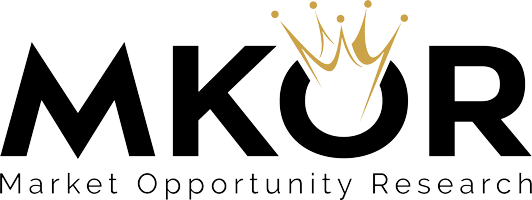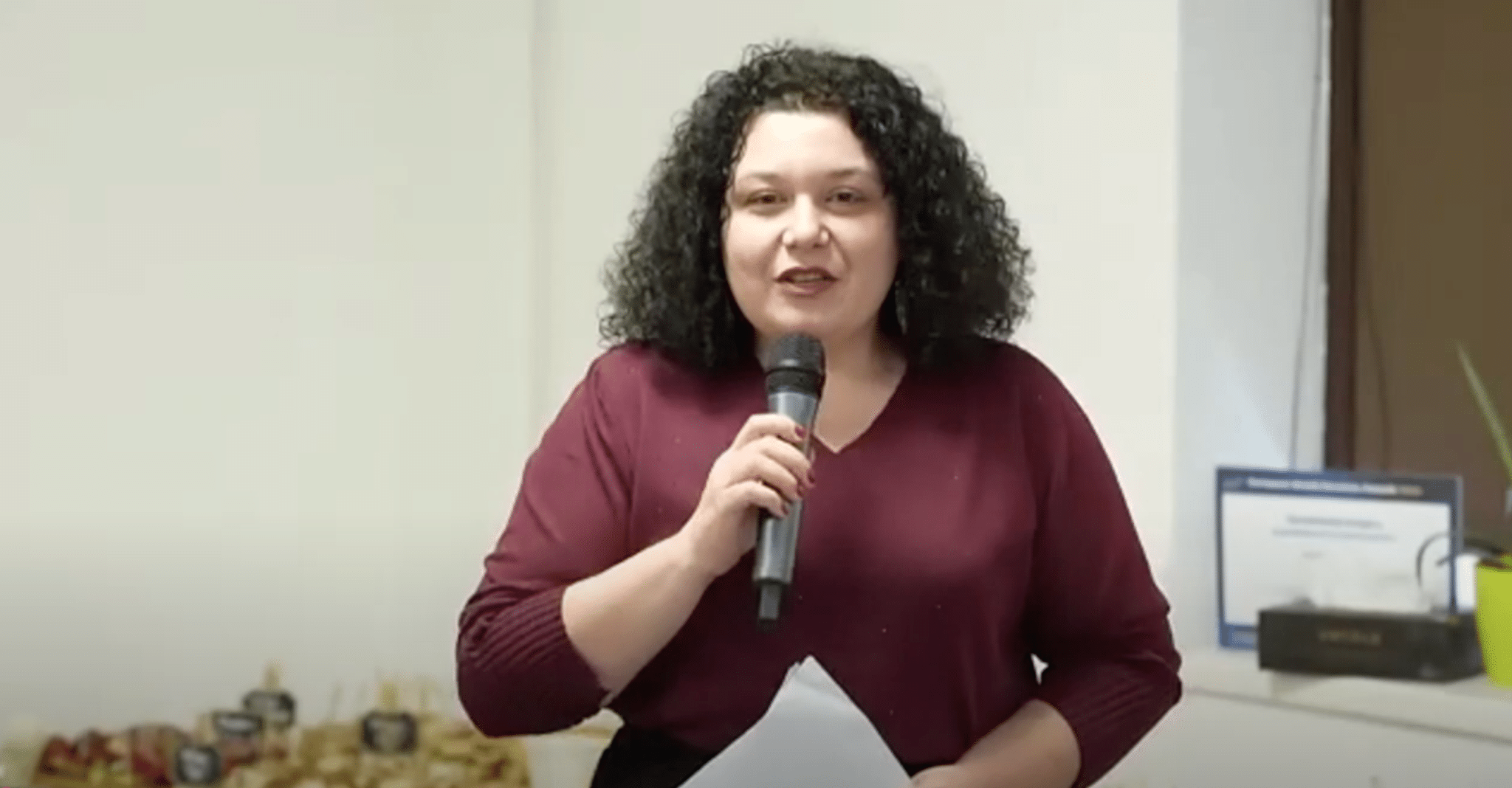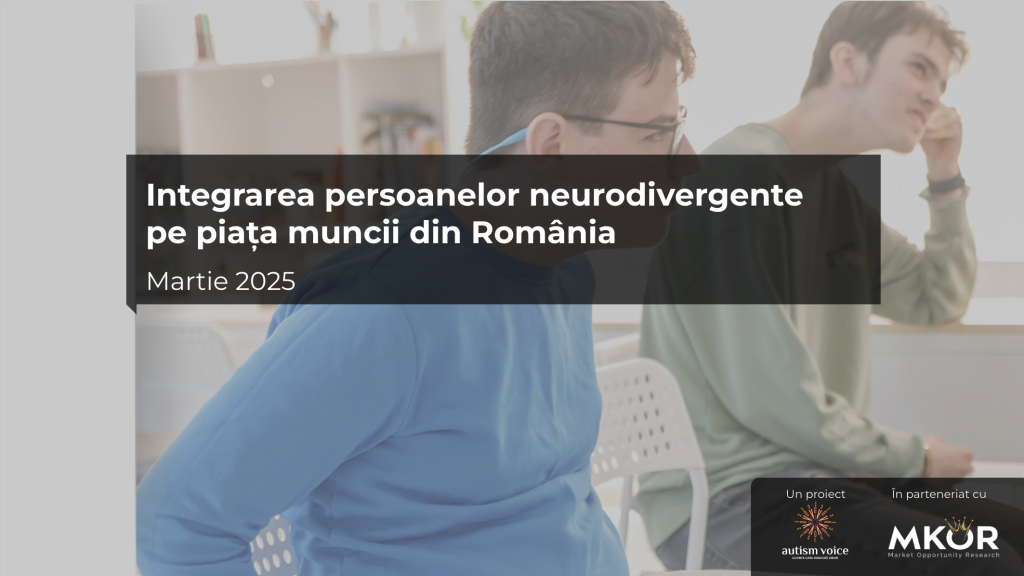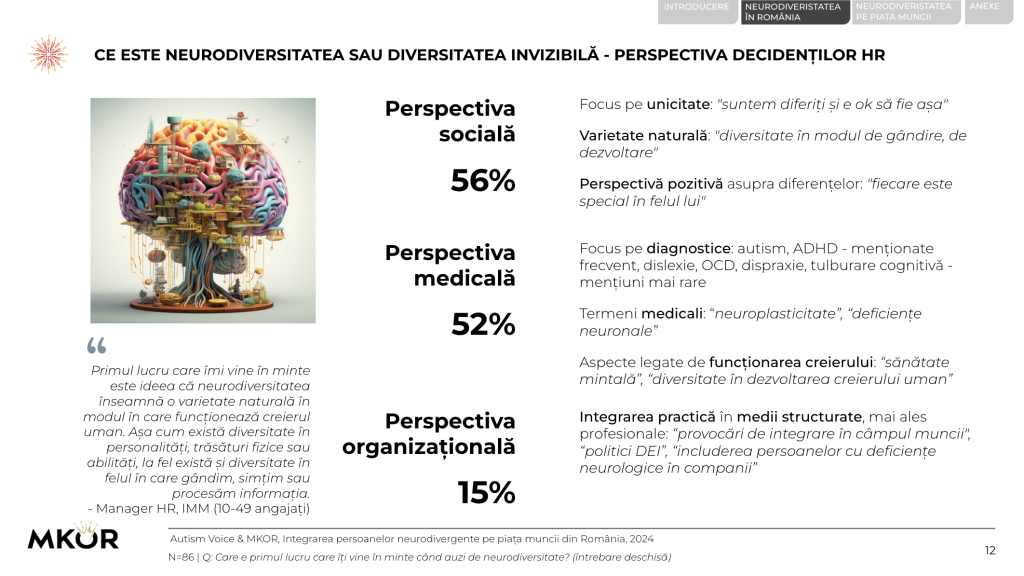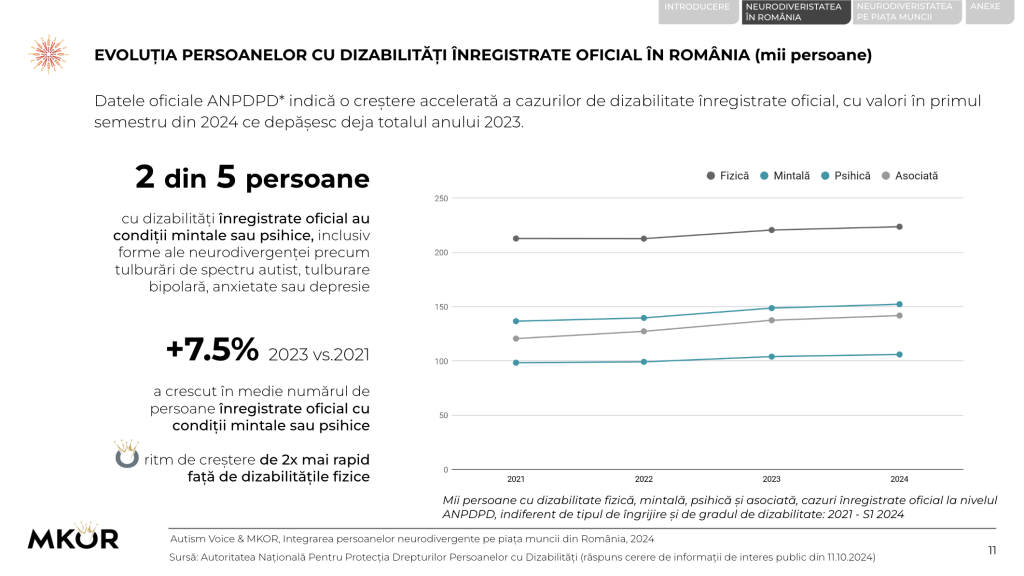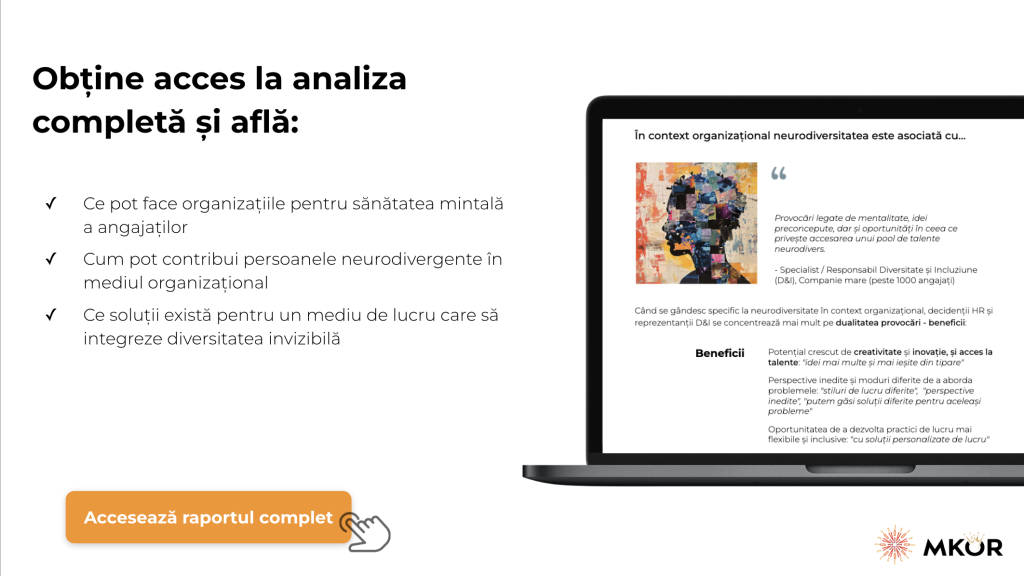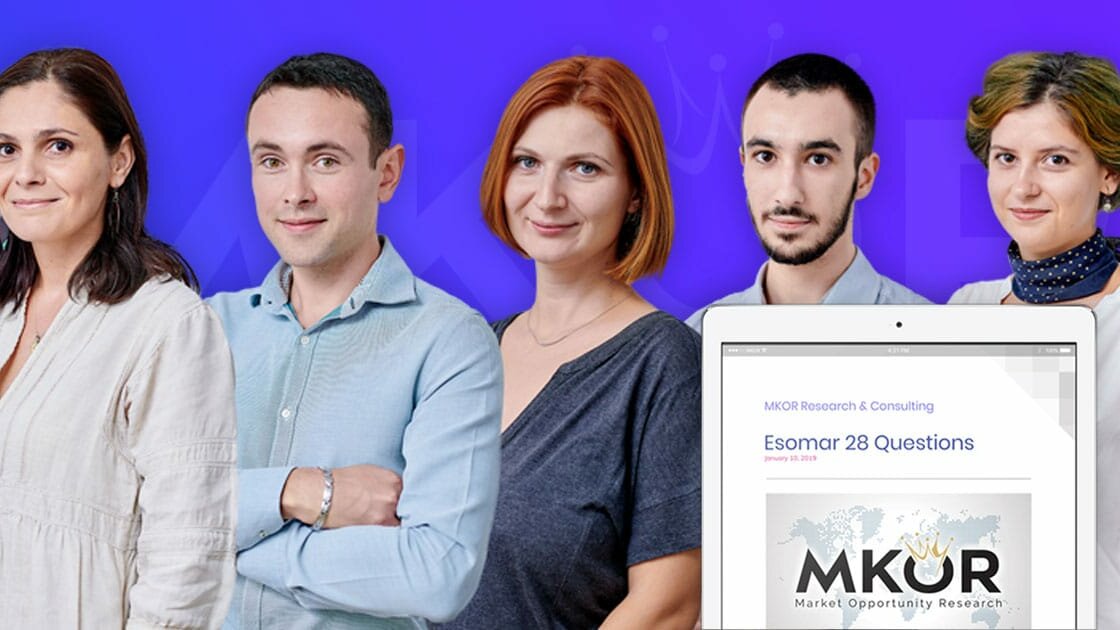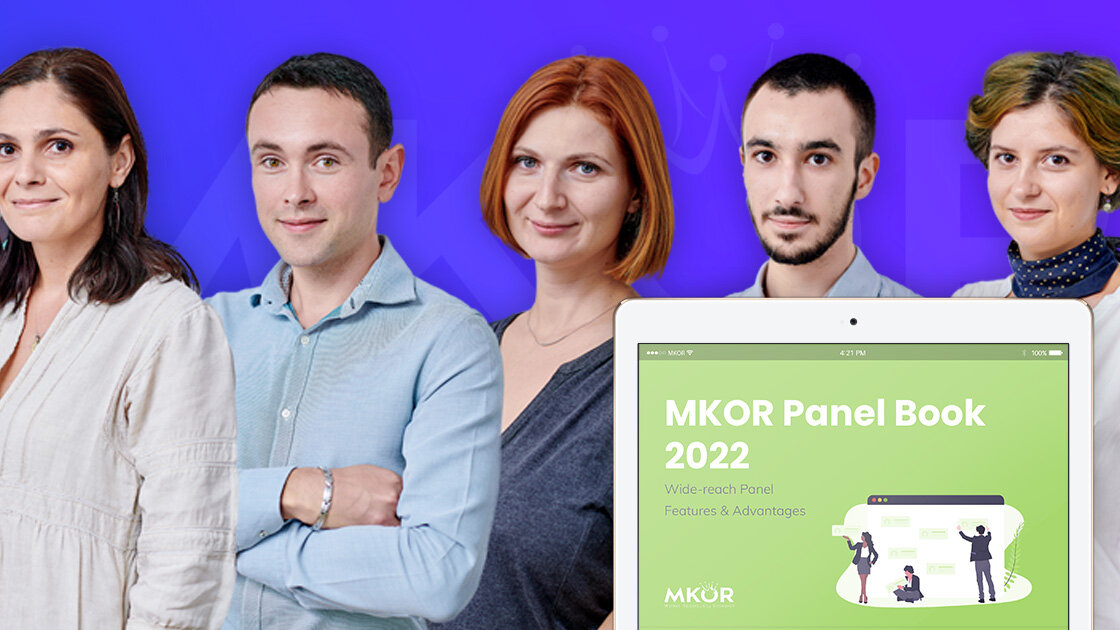Neurodiversity is a key concept for understanding how the human mind works, encompassing both neurotypical individuals and those who are neurodivergent.
In Romania, however, official data on neurodiversity is fragmented, making it difficult to form a clear picture of the current situation of these individuals in society.
Content
Neurodiversity represents the natural variation in the way the human brain functions. This concept highlights that people think, learn, and process information in different ways—variations that may be innate or acquired over the course of life, shaped by experiences or events.
Among the most common diagnoses observed among neurodivergent individuals are:
- Autism Spectrum Disorder (ASD) – impacts communication, social interaction, and repetitive behaviors.
- Attention Deficit Hyperactivity Disorder (ADHD) – characterized by difficulties with focus, impulsivity, and hyperactivity.
- Anxiety disorders – including phobias, generalized anxiety disorder, and panic attacks.
- Depressive disorders – marked by prolonged sadness, loss of interest, and low energy.
- Bipolar disorder – involves alternating episodes of mania (high energy, impulsivity) and depression.
Other frequently encountered diagnoses include:
- Dyslexia (reading and writing difficulties)
- Dyscalculia (challenges in processing numbers and mathematical concepts)
- Dyspraxia (difficulty coordinating movements)
- Tourette syndrome (motor and vocal tics)
- Burnout (severe mental exhaustion caused by chronic stress)
Conditions such as autism, ADHD, learning difficulties, and other neuropsychological disorders should not be viewed solely as deficiencies, but rather as part of the normal spectrum of human diversity. Recognizing and understanding these differences plays a crucial role in building a more inclusive society—one in which each individual can fully realize their unique potential.
To provide a clearer picture of the challenges and opportunities related to neurodiversity in the workplace, Autism Voice, in partnership with MKOR, has conducted the first national study on neurodiversity in organizations.
This research contributes to a better understanding of how companies can create more inclusive environments—ones that embrace neurodiversity and support the professional and personal development of neurodivergent individuals.
To build a fair and inclusive work environment, we need data, solutions, and relevant voices. We’ve taken the first steps toward inclusive employment by uncovering essential insights about the integration of neurodivergent individuals in the labor market.
The study’s launch event, held on March 18 at the Autism Voice Institute, brought together key voices in the field of inclusive employability. The guest list included experts in legislation, psychology, behavioral analysis, representatives of public institutions, and neurodivergent individuals who shared their personal and professional experiences.
Speakers included:
- Mădălina Iorga (Senior Consultant, MKOR)
- Nicoleta Orlea (Head of Communication and Fundraising, Autism Voice; certified Work Aid Kit trainer)
- Delia Popa (Vocational Counselor, BCBA; Work Aid Kit trainer)
- Anca Dumitrescu (President, Autism Voice; BCBA)
- Romi Mihăescu (Secretary General, ANPDPD)
- Adina Iancu (Psychologist diagnosed with Asperger’s, Autism Voice intern)
- Mihnea Stoian (Entrepreneur, investor, diagnosed with autism)
- Dana Dunel-Stancu (Lawyer and expert in equal opportunities)
The event highlighted both the challenges and the opportunities related to the integration of neurodivergent individuals into the labor market. The study provides a foundation for systemic change, emphasizing that success depends on collaboration between employers, authorities, civil society, and neurodivergent individuals themselves.
Discover what the numbers reveal. Download the free summary of the first national study on neurodiversity and labor market integration.
The Situation of People with Physical, Mental, and Psychological Disabilities
In Romania, statistics on physical disabilities are better documented than those related to neurocognitive and psychological disorders. Individuals with neuropsychological disabilities are often grouped into broad categories, without a clear distinction between different types of conditions. The stated reason is the desire to uphold individuals’ rights—therefore, data on medical diagnoses is not processed, with only basic information on the type and degree of disability being recorded.
Furthermore, Romania currently lacks a unified national registry for tracking neurodivergent individuals. The available data is scattered across institutions such as the Ministry of Health, the Ministry of Labor and Social Protection, and the Ministry of Education, making it difficult to monitor and integrate this information effectively into society.
Challenges in Data Collection
Most available statistics focus on children diagnosed with ASD or ADHD. Unfortunately, there are no clear mechanisms in place to track these individuals into adulthood.
Many cases remain undiagnosed or are diagnosed late due to several factors:
- Systemic causes: Limited access to diagnostic services, lack of adequately trained specialists, and poor coordination between institutions.
- Individual perceptions: Not all neurodivergent individuals recognize their condition as a medical issue that requires diagnosis.
- Social and cultural factors: Stigma and reluctance to talk about these conditions—especially among adults—further contribute to the invisibility of the phenomenon.
Without a solid data foundation, integrating neurodivergent individuals into education, the labor market, and society remains a difficult process. There is a need for:
- A national registry to enable long-term tracking of neurodivergent individuals
- Training specialists in diagnosis and early intervention
- Awareness campaigns to reduce stigma around neurodivergence
- Programs dedicated to supporting the transition from education to employment
Addressing these challenges could transform neurodiversity from an invisible, often overlooked issue into an essential and acknowledged part of a more inclusive and equitable society.
The first thing that comes to mind is the idea that neurodiversity means a natural variation in the way the human brain works. Just as there is diversity in personalities, physical traits, or abilities, there is also diversity in how we think, feel, and process information.
—HR Manager, SME (10-49 employees)
Download the summary of the study „Integrating Neurodivergent Individuals into the Romanian Labor Market” for free.
Why Do Neurodivergent Individuals Remain Invisible in the Labor Market?
The Autism Voice and MKOR study highlights a striking paradox: although the number of individuals with mental and psychological conditions has increased by 7.5% over the past 4 years—twice the rate of growth in physical disabilities—these individuals largely remain invisible in the labor market.
Although over half of the organizations in the labor market (52%) have implemented official Diversity, Equity, and Inclusion (DEI) policies, their focus tends to be more on gender and age diversity, while neurodiversity remains a secondary concern.
The lack of visibility of neurodiversity at the organizational level is confirmed by the decision-makers interviewed:
I think there’s not as much talk about [neurodiversity], there’s not as much awareness in this area, so… it’s been overshadowed by everything else.
— Manager / Communications Specialist, Large Company (over 1,000 employees)
Mădălina Iorga, Senior Researcher at MKOR, explains that the reduced visibility of neurodivergent individuals reflects a deeper structural issue within organizations: the absence of clearly defined systemic mechanisms.
Unfortunately, 65% of companies either address neurodiversity informally or not at all, highlighting the generally low level of organizational preparedness to recognize, integrate, and support neurodivergent people in a meaningful way.
We still haven’t done anything in this regard. I mean, since last year we signed the ‘Diversity Charter’ and tried to take some steps in that direction, and we’ve held all sorts of events and communications […]
As for neurodiversity specifically, we’ve done nothing until last week’s workshop […]. But we have plans for next year—I hope we get support.
— DEI Manager, Large Company (over 1,000 employees)
The need for education and support for employers is also acknowledged by the decision-makers interviewed. Over half (55%) are interested in attending specialized training and consulting sessions, especially in order to better support and include neurodivergent individuals (78%) and to build competencies in this area through access to resources (59%) and specialized tools (57%).
A Comprehensive Approach for a Real Understanding of Neurodiversity
The study conducted by Autism Voice, in partnership with our market research agency MKOR, offers a detailed perspective on neurodiversity in Romania’s professional environment. Using a mixed methodology that combines desk research and qualitative research, the study identifies real challenges and opportunities for integrating neurodivergent individuals into the labor market.
This study is an important first step in bringing public and decision-maker attention to the reality of neurodiversity in the workplace. Its conclusions aim to support:
- Professional integration – the study provides data on employers’ openness to hiring neurodivergent individuals (42% expressed positive intent).
- Support for legislative processes – the information collected can help improve the legal framework for employment and education.
- Evidence-based policy development – the study’s recommendations can inform the creation of data-driven public policies designed to increase access to meaningful employment for neurodivergent individuals.
Study Methodology
To carry out this study, MKOR used a mixed methodology combining desk research and qualitative research over a 6-month period.
Desk research involved collecting and analyzing data from relevant national and international sources, including:
International organizations: IHME (Institute for Health Metrics and Evaluation), UNICEF, WHO (World Health Organization)
Romanian administrative data: ANOFM (National Employment Agency), ANPDPD (National Authority for the Rights of Persons with Disabilities), INSP (National Institute of Public Health)
Qualitative research consisted of conducting semi-structured interviews with professionals involved in hiring and inclusion processes. This approach aimed to better understand the needs, barriers, and opportunities experienced by both neurodivergent individuals and employers.
The study sample included HR directors, team managers, DEI specialists, and company representatives with varying levels of knowledge and experience related to neurodiversity.
The sample was randomly selected. Data was collected both online and through in-depth interviews.
Work Aid Kit – A Solution for Integrating Neurodivergence into Organizations
Since 2008, Autism Voice has provided specialized support for over 11,000 children with neurodevelopmental disorders, helping them make significant progress in recovery and integration. Through local and national programs, the organization has developed essential solutions in areas such as prevention, mental health, school inclusion, social inclusion, the development of independence, and behavioral recovery.
Starting in 2021, Autism Voice expanded its efforts through the Autism Voice Institute, developing dedicated programs aimed at labor market inclusion and non-formal education for young people with autism and other neurodevelopmental disorders. Initiatives such as Life Autism, Social Skills Training, and Work Aid Kit help young people improve their social skills, become more independent, and access employment opportunities tailored to their needs.
Work Aid Kit, developed by experts certified by Autism Voice, is a comprehensive program that supports companies in the process of integrating neurodivergent individuals into their teams. This program offers customized solutions and resources tailored to each organization’s specific needs, turning diversity into a competitive advantage.
What does Work Aid Kit include?
- Specialized training for teams and management, focused on understanding and leveraging neurodiversity in the workplace.
- Tailored consultancy for the effective recruitment and integration of neurodivergent individuals.
- Implementation of support systems – such as buddy and mentoring programs to ensure a smooth transition into the workplace.
- Guides and internal procedures designed to develop a culture of inclusion within organizations.
- Assistance in adapting work processes and environments to the specific needs and abilities of neurodivergent individuals.
„By integrating talents such as those of neurodivergent individuals, organizations strengthen their competitive advantage and build an organizational culture that reflects the values of a modern and radically transforming society. This endeavor is not just a strategic move, but a declaration of trust in the creative potential of each of us—one that deserves to be discovered and maximized.”
— Nicoleta Mariana Orlea, Director of Communication and Fundraising at Autism Voice and trainer in the Work Aid Kit program
Through Work Aid Kit, organizations not only align with the latest legal requirements (OUG 127/2024), but also transform compliance into a genuine opportunity for innovation, development, and social responsibility.
Learn how neurodiversity can become a competitive advantage for your company. Download the full study „Integrating Neurodivergent Individuals into the Romanian Labor Market” and support the work of Autism Voice.
Turn Diversity and Inclusion into a Competitive Advantage with MKOR
Understanding employee needs and achieving genuine diversity integration are essential for any organization’s success. MKOR’s research—such as Employee Sentiment 2024 and Diversity & Inclusion in Companies: The Employer Perspective—shows that inclusive organizational cultures lead to higher retention, satisfaction, and performance.
If you’re aiming to engage your teams with an inclusive culture and want to know what diversity measures top employers are implementing, MKOR can help you:
- Conduct customized market studies tailored to your company’s specific needs
- Evaluate employee perceptions of diversity, inclusion, and belonging
- Identify opportunities for improving your organizational culture and performance
We’re here to help you transform how your teams work and perform.
Contact us to view our research portfolio and discover what we can create together.
